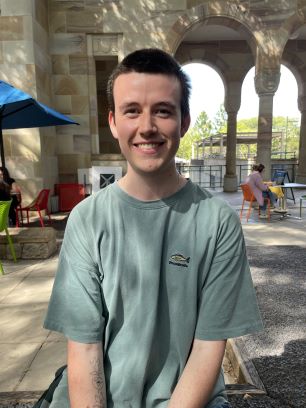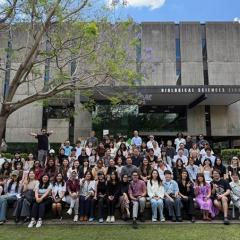AustLit and The University of Queensland are joining forces to give students a world class education and exciting opportunities to use it, and it’s the students themselves winning most of all.
What is AustLit?
AustLit is a not-for-profit database of Australian literature and media; the largest and most comprehensive in Australia, marking 1 million records in 2023. It’s the product of more than twenty years of collaboration of researchers, librarians, and scholars from Australian universities, and UQ is proud to have been the lead contributor and home for AustLit since 2002. But it’s not just established professionals making their mark: each year, AustLit opens opportunities to UQ students to take up internships to contribute to this monumental undertaking and put their skills and talents to work in a professional scholarly setting. Some of them more than once!
Hear from our students

Bachelor of Arts / Bachelor of Social Science (English Literature)
“For students considering an internship, I’d say do it! UQ really know what they’re doing - they’re so organised, and these internships are a great asset. Do it!”
Carly Watson went into her internship determined to get practical experience flexing the education she was getting at UQ.
“I thought, ‘what else can I do with my literature degree? What else is out there?’ So I think for me it was an opportunity to put into practice the skills I’d developed. I loved it.” Her work focused on her entry into AustLit’s ‘Necessary Conversations’ series, which is a curated list of Australian literature targeted towards children and young people. Carly’s own entry into the series focuses on the topic of homelessness. It’s now publicly available for parents and educators looking for information and resources to broach such a challenging topic with children and teens here.
“AustLit has a big focus on grounding this series in actual social research too. So I also interviewed Skye Constantine (a research specialist in the topic from UQ’s School of Social Science) before assembling the list.”

Master of Communication (Strategic Communication)
“One of the main strengths about UQ is the opportunity to turn theory into practice, and learning theory with a real world connection. I really like that. It’s an even playing ground for everyone; you do your research and listen to your lecturers, and basically you can conquer the world.”
Sabrina Yeshwant Pradhan had a different focus for her internship: using the knowledge and skills in strategic communications to draft a proposal for an awareness campaign for AustLit itself.
“Some of the background research I did indicated that there is a large proportion of schools and teachers who basically don’t know about AustLit. There just isn’t enough knowledge about it out there.” Sabrina was invited to create a campaign proposal and presentation for AustLit staff on how to propagate the knowledge of AustLit as the largest and most complete database of Australian literary works and media content. She already has ideas for her next internship, following up on that plan. “I’m honestly hoping to get more inspiration, to upskill a bit, and head back out.”
She’ll get the opportunity. The UQ/AustLit partnership is amazingly fruitful, and AustLit is still hungry for UQ students with a passion for literature, communication, research, and writing who are ready to expand their skills and put that passion to work.

Bachelor of Communation (Public Relations)
“Talk to your teachers! They appreciate a conversation in class, even after class, so don’t feel scared about approaching and asking for help. UQ is very personal and appreciative.”
David Tang recalls his recent internship warmly, too. “I was surrounded by book nerds! And they were so passionate about their work, and it really rubbed off on me. I was really inspired by them. Great people and very friendly.”
David’s internship placed him in a team doing research for Dr Leah Henrickson’s ‘AI in the Australian Archive’ project to create a dataset in AustLit covering the rapidly developing fields of robotics and artificial intelligence. After composing the preliminary dataset and the website to make it available, there was room to draw some interesting conclusions from the data; some of which became the basis for articles submitted to journals interested in the topic.
“I learned how to create an author pitch at AustLit. It’s very different from writing an essay in an academic style. We were trying to get a public conversation started about AI, so we had to keep it readable and simple and fast, which is completely counterintuitive to what we usually do in academic writing.” The ‘AI in the Australia Archive’ project is still under development, but a sample is available online already here.
In his time at AustLit David also co-authored a fascinating article for The Conversation entitled: 'Australian writers have been envisioning AI for a century. Here are 5 stories to read as we grapple with rapid change.'

Bachelor of Arts (English Literature and Philosophy)
“Try to see your lecturers not just as people who lecture, but as human beings who are experts in something you’re really interested in. There’s nothing to lose in trying to form professional relationships with people like that!”
Most recently, Andrew Millar’s placement at AustLit saw him as part of a team helping UQ lecturer and scholar Dr Tom Doig researching ‘doomsday preppers’ - people obsessed with preparing for the collapse of civilization. Andrew and the rest of the team sifted through the massive AustLit database for relevant writings, records and references to compose a clean and accessible dataset on the subject.
“We came up with a tiered system for ranking the works by how closely or distantly they were related to prepping, and things like that. So you can explore the whole dataset, but then you can kind of narrow in as well.” As well as serving as a collated source for Dr Doig’s upcoming book We Are All Preppers Now, the Preppers and Survivalism project dataset is available on AustLit freely for anyone to browse here.
It wasn’t Andrew’s first opportunity interning at AustLit. The year before, he was part of a team of interns assembled to assist with Associate Professor Margaret Henderson’s ‘Australian Writing and Rock Music’ project: a grand endeavor to establish a nexus of connective data between Australia’s rock music scene, and everything written about Aussie rockers across the decades.
“My particular role in that project was about spatially mapping and specifying where bands were formed, so that you can actually map some of these rock scenes and kind of see where they were formed and when, so you can kind of trace a lineage spatially of how certain rock movements might have emerged.”

Bachelor of Arts/ Bachelor of Science (English Literature and Mathematics)
“You don’t know what you’re going to get until you start - I had so much fun, and got opportunities I never expected in an undergraduate internship!”
Jess Dickinson was also part of the team of UQ students taking up the call to investigate the foundations of aussie rock and roll. “The fun bit was when it was a compiled dataset, actually looking at trends and seeing what we could find from that and writing about the cool stuff that we found. We did a page on our little section of the website about the research, and I wrote up my own page which was all about women in rock, and what the data showed us about them.” All the work the team did on this project is also available freely to the public here.
Jess found the project so rewarding she signed up for a second internship at AustLit. This time, she was invited to use her skills to assist AustLit’s Director, Associate Professor Maggie Nolan, in the study of ‘Irishness in the Archives’: the way Irish people and culture are depicted, represented, and acknowledged throughout the history of Australian literature. Ultimately, she was invited to present her findings to the annual conference for the Irish Studies Association of Australia and New Zealand (ISAANZ) in Melbourne.
“Maggie said to me, ‘I’ve just submitted this to a conference and they want us to speak at it. It’s your research, come with me.’ My research, my writing. And I got to stand up there and explain to everyone why I thought it was cool, you know? It was so fun.” The experience convinced Jess that, even though she's planning to finish her Bachelors and Masters at UQ, she already has what it takes to conduct research at a professional level. “I definitely learned how to do research with academics who had a goal, and we could work towards it together and be creative and bounce ideas off each other. It was invaluable.”

Bachelor of Arts (Professional Writing and Communication)
“Consider taking a mix of the subjects that appeal to you, and challenge you. The creative sort of stuff is easier for me, but I’ve really liked learning all the different kinds of writing and techniques from the professional writing and comms side!”
Marianne Robinson is in her third year at UQ and has just begun her AustLit internship. She’s looking forward to the experience.
“I’m so glad I got into this course and the placement at AustLit. I think it’ll help me choose what I might want to do with my degree once I’ve graduated.” Currently, she’s working on a new project with AustLit to honour David Malouf, one of Australia’s most decorated and multi-talented writers.
“Right now I’m going through all his works in the AustLit database looking for anything we can add to make the entries complete so we can put them in. But it’s his 90th birthday this year, and we’re planning to create a tribute for him.”
When it’s complete, the work that Marianne has done will add more information and value to the great wealth of contribution interns like herself have put into AustLit’s 23 year legacy. The School of Communication and Arts is proud to partner with AustLit to grow the literature database and add to its many wonderful projects, and to empower students with the knowledge and experience to thrive in academia and beyond.
Research opportunities and internships, including with AustLit, are available to students studying at The University of Queensland in both Summer and Winter Research Programs, detailed here.
By Brendan Lee Cottam



